
1,236+ PILLS
That’s how many free emergency contraceptives an LSU club has handed out so far. Read on page 2




That’s how many free emergency contraceptives an LSU club has handed out so far. Read on page 2


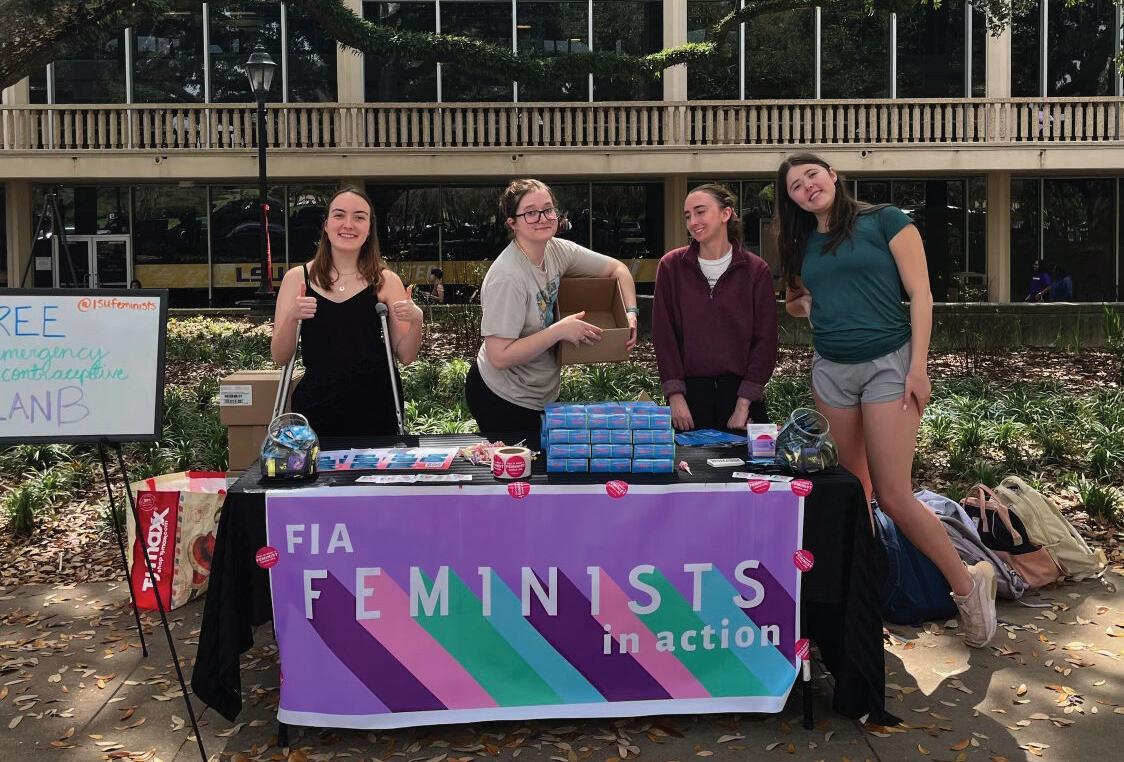
The LSU student organization Feminists in Action has distributed over 1,200 units of emergency contraception in the last month and a half to anyone who needs it, no questions asked.
The group obtained 1,500 units of emergency contraception through grants with nonprofit Advocates for Youth and the American Society for Emergency Contraception’s EC4EC program, which stands for emergency contraception for every campus. One unit contains one tablet, which would usually cost $50 over the counter. But for LSU students, they’re free through FIA.
As of right now, the LSU Student Health Center doesn’t offer free emergency contraception for students, except in cases of sexual violence. College students don’t make a lot of money, explained Lillian Sims, a psychology sophomore and FIA’s Planned Parenthood chair.
“We saw it; we knew there was a demand,” Sims said.
FIA started distributing emergency contraception by tabling in Free Speech Alley. The club also went further by delivering the pills on a personal basis, learning of those who needed the contraception by word of mouth and through Instagram.
Many FIA officers even wore small side bags full of the emergency contraceptives, delivering to as many as 10 people a day.
As of Friday, the organization had connected students with 1,236 units. That’s the equivalent of more than $60,000 worth of emergency contraception.
Sims said the only requirement to get the tablets was to ask for them.
“We just want to make sure people who need it are getting it, no matter what,” Sims said.
When the Supreme Court overruled the landmark case, Roe v. Wade, in 2022 that protected access to abortion under the Constitution, restrictions began in earnest. Since then, 14 states have passed laws making abortion illegal, and others have put strict limits on the procedure.
In Louisiana, a law that had been on the books since 2006 acted as an abortion trigger ban, going into effect immediately after the reversal of Roe v. Wade. Doctors who perform illegal abortions in the state can face prison time of up to 10 years and fines up to $100,000.
FIA president Myrissa Eisworth, an anthropology and sociology senior, said the organization has been looking for ways to get emergency contraception on campus since 2022. The goal is to remove the barrier of cost to emergency contraception in a “post-Roe world,” she said.
“Our peers have a right to make decisions about their bodies and their futures,” Eisworth said.
Emergency contraceptives, like the Julie-brand morning after pills distributed by FIA, are not subject to Louisiana’s abortion law.
Morning after pills work by preventing pregnancy before it starts; the active ingredient, levonorgestrel, temporarily stops the ovaries from producing eggs. If taken within the suggested 72-hour window, the morning after pill can prevent
between 75-89% of pregnancies, according to Planned Parenthood.
FIA Vice President Layla Harmon, a political communications junior, has been working on an emergency contraception survey with the LSU Reilly Center for Media & Public Affairs. The survey studies what barriers to access for emergency contraception LSU students face and how educated they are on what emergency contraception is and how it works.
“Students are generally aware of EC and know where to get it,” Harmon described the survey results, “but also educa-
tion and basic facts are needed, and there are access barriers — most notably cost, anxiety and stigma around EC.”
FIA is gearing up for their Take Back the Night event, taking place April 16 at Memorial Tower, where they’ll be distributing emergency contraception kits including one unit of contraception, a pregnancy test, condoms and more.
After they fully distribute their supply, FIA will be working with the Baton Rouge chapter of the National Organization for Women and potentially other groups to continue to provide free emergency contraception for LSU students.

LSUReveille.com
@lsureveille


B-16 Hodges Hall

Louisiana State University
Baton Rouge, La. 70803
(225) 578-4811
Editor
Managing Editor
Digital Editor
Deputy
Entertainment
(225) 578-6090
Layout/Ad Design BEAU MARTINEZ
Layout/Ad Design SAMUEL NGUYEN NEWSROOM
The Reveille holds accuracy and objectivity at the highest priority and wants to reassure its readers the reporting and content of the paper meets these standards. This space is reserved to recognize and correct any mistakes that may have been printed in The Daily Reveille. If you would like something corrected or clarified, please contact the editor at (225) 578-4811 or email editor@lsu.edu. ADVERTISING
The Reveille is written, edited and produced solely by students of Louisiana State University. The Reveille is an independent entity of the Office of Student Media within the Manship School of Mass Communication. A single issue of The Reveille is free from multiple sites on campus and about 25 sites off campus. To obtain additional copies, please visit the Office of Student Media in B-39 Hodges Hall or email studentmedia@ lsu.edu. The Reveille is published biweekly during the fall, spring and summer semesters, except during holidays and final exams. The Reveille is funded through LSU students’ payments of the Student Media fee.
The Louisiana iris is characterized by its strength and resilience in the hot and humid climates it is native to, re-growing each spring despite the difficulties it faces. That unwavering spirit is why the flower is demonstrative of the survivors of domestic violence at Iris Domestic Violence Center, Executive Director Patti Joy Freeman said.
Located in Baton Rouge, Iris provides free housing, resources and legal representation to survivors of domestic violence and their children. Iris is the largest domestic violence organization and shelter in Louisiana.
“We serve eight parishes through Iris Domestic Violence Center,” Freeman said. “There are only 16 shelters, so all parishes in Louisiana are split between those 16 shelters, so we serve a population of over 850,000 people, just Iris alone.”
Domestic violence is a “pattern of behaviors used by one partner to maintain power and control over another partner in an intimate relationship,” ac-

cording to the National Domestic Violence Hotline. This can include various types of violence, including emotional, physical and financial abuse.
BY ALAYNA FORD @alayna_forddThe International Student Association hosted their 14th annual International Fusion celebration in the LSU Student Union Theater on Wednesday.
The purpose of International Fusion is to highlight the importance of cultural diversity and inclusivity within the LSU community. The event displays different cultural dances from around the world and gives international students an opportunity to showcase their talents.
Survivrs of domestic violence usually return to their abuser seven times before breaking free of the relationship, Freeman said. Because of this, the support Iris provides survivors is crucial to their well-being.
“I think getting the information out there so that they’re aware that there are services that can help them escape from
that type of environment,” Freeman said. “And secondly, providing those resources that help them stay out of that environment and gain the confidence and the self-empowerment to
“International Fusion is the biggest multicultural event organized by an organization here at LSU because we have more than 10-13 countries here performing,” said ISA President Md Tanvir Ahmed Sarkar, a thirdyear civil engineering doctoral student from Bangladesh. “So we see this as an opportunity for the LSU community to see
The Student Health Center hosted Tiger Wellness Week, five days full of engaging programming to connect with students about their health, starting on March 18.
Put together by the Wellness and Health Office, Tiger Wellness Week looks to engage students about the various aspects of their health. Partnering with Campus Life and University Recreation, the health center hosted several events to connect with students on campus, including a partner showcase, free HIV testing and a yoga class at the UREC.
llness Week focused especially on physical, social and emotional wellness.
The health center bases its work off the LSU Wellness Wheel, a holistic approach to student health that features 10 dimensions, such as physical, social, financial, sexual and emotional health. Students can use this wheel to identify the aspects of their health they feel need care.
“I feel like it’s really empowering to say that if I’m paying attention to these things, then my overarching well-being is going
to be in a good place,” Director of Wellness and Health Promotion Michael Eberhard said. “I think that’s what all students want.”
The Wellness and Health Office is one of the units within the health center. They are focused on outreach and education relative to the issues the health center emphasizes. Some of the direct patient care the Wellness and Health Office provides includes wellness coaching, nutrition counseling and case management.
To promote student wellness, the health center organized a full week of activities.
On March 18, the center hosted the Wellness Affair Kickoff Event, where its campus partners were brought together in a showcase for students.
March 19, there was a Spring Equinox Flow yoga class at the UREC from 7–8 p.m. During the day, mental health providers from the health center met with students at the “Let’s Talk Mental Health” event, hosted at the African American Cultural Center. These events tried to reach students who are unfamiliar with the mental health services the center provides.
“It’s just a conversation with a therapist,” Eberhard said. “It’s
not like a formal therapy session, but they’re kind of getting to know the therapist or talking through a challenge that they are having, and potentially finding an opening to maybe coming to the health center if they found that helpful.”
The health center hosts these events several times a month.
The next “Let’s Talk” event is scheduled for March 27 from
1:30-2:30 p.m. at the Art and Design Building. All students are welcome. Eberhard also said students can come to the health center at any time and receive mental health services the same day.
“The goal is just to be in that space and then to hope that students happen to find them and just engage in a passive conversation,” Eberhard said. “I think
that’s the goal. Try to be where the students are and hopefully from that interaction they’ll be more likely to access the service.”
Students pay for the medical services offered by the Medical and Sexual Health and GYN clinic, and most major insurance providers are accepted. If
see HEALTH, page 4
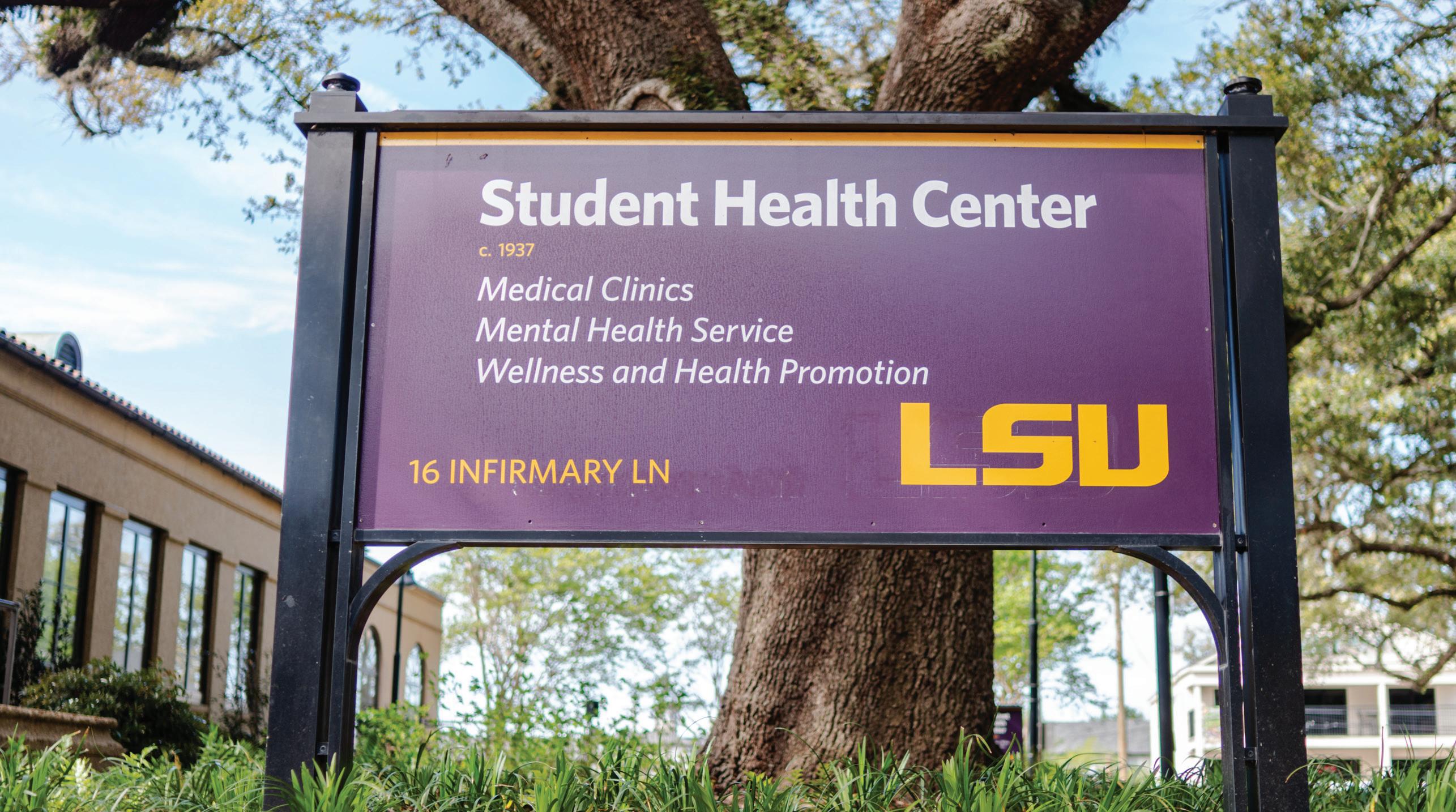
SAFETY, from page 3
continue without returning to that type of relationship again.”
Freeman said oftentimes survivors will come to Iris for support, instead of law enforcement. Though Iris provides support to go to law enforcement and the subsequent legal representation at a hearing, Iris doesn’t require survivors to report the abuse they have experienced.
“Of course we want there to be consequences for the offender, but we don’t want to take that choice away from a victim,” Freeman said. “They’ve had enough choice taken from them. They need to feel that they are in control of their own life.”
In 2022, Freeman took the executive director position at Iris just one day after retiring from almost 30 years of experience with the East Baton Rouge Sheriff’s Department. At the department, Freeman started and supervised the Domestic Violence Unit. It was with this unit that she first came in contact with Iris.
Iris’ Safe House Sheltering Services house over 500 people per year. Survivors of domestic violence qualify for on-site residence at Iris if they are fleeing violence and are in imminent danger or are homeless as a result of violence. They can stay at Iris for up to 45 days in a private room.
From there, transitional
CULTURE, from page 3
their dances, music, traditions and cultures.”
ISA is an active organization on campus, educating the LSU community on different cultures and providing students with a safe space to be themselves.
“I love that LSU is so diverse, and I think there is something for everyone whatever your interests are,” said second-year French doctoral student Alicia Hilaire. “We get to come together here, and I get to meet peo -
housing begins. The survivor will move to a new room for up to a year as they work toward sustainable employment, a method of transportation and permanent, safe housing. This transitional housing program was started in 2023 to further support Iris’ clients.
Oftentimes, survivors will bring their children to Iris, which accommodates the children and works to support them as well as their parents.
Iris works in cooperation with law enforcement agencies to provide the support officers cannot, including transportation and other services, providing everything the survivor will need in daily life.
“What they need also, and sometimes more importantly, is the support, the resources and the services that provide an outlook that looks other than what they’ve come from,” Freeman said. “Showing them that basically love shouldn’t hurt, and teaching and helping and walking beside them while they learn.”
The most dangerous time for domestic violence survivors is when they leave their abuser. The next most dangerous time is near court hearings, Freeman said. To support survivors through this process, Iris provides free attorneys, representation and advocacy in court for its clients.
ple from Sri Lanka and people that are from Asia.”
International Fusion, like many ISA events, is open to any student, including those wishing to celebrate another culture. K-Core, a student dance group, came together to dance to Korean pop music as Americans.
“This is my second year performing in International Fusion,” said mass communication junior Rayanna Wilson. “K-Core is an open thing for everybody to come dance with an open mind and have fun.”
ISA had two other events
Iris’ legal team specializes in protective order representation, completely free of charge regardless of the survivors’ income. If clients have further legal needs, such as divorce or child custody, Iris has a partnership with Southeast Legal, which will provide this representation.
Iris is a nonprofit that heavily relies on government funding and donations. Last year, legislators approved a $7-million increase in funds to be spread between the 16 shelters in the state. To receive this money, each shelter had to outline new services this funding would enable them to provide. This inspired Iris to open a children’s center in May 2023.
This center will provide support for children who are coming from violence, independent of their parent’s needs. Freeman said it’s crucial to remove children from these situations to teach them how harmful abusive relationships are so they don’t repeat this pattern later in life, either as an abuser or as a victim.
“That children’s program is being developed because if we ever hope to reduce numbers in domestic violence then we need to provide care and independent assistance and resources to the children who are introduced to that violent environment, so that they understand that that should not be how a normal relation-
open to the public this month.
On Friday, they hosted Mythology Night in partnership with the African Graduate Student Association, and an ongoing virtual art and photography exhibition will run until April 18.
“The founding goals of ISA was to create a safe space for the international students here at LSU, make their life comfortable, and bridge the gap between cultures and building unity,” Sarkar said.
Students can learn more about ISA events on the organization’s Instagram, @isa_at_lsu.
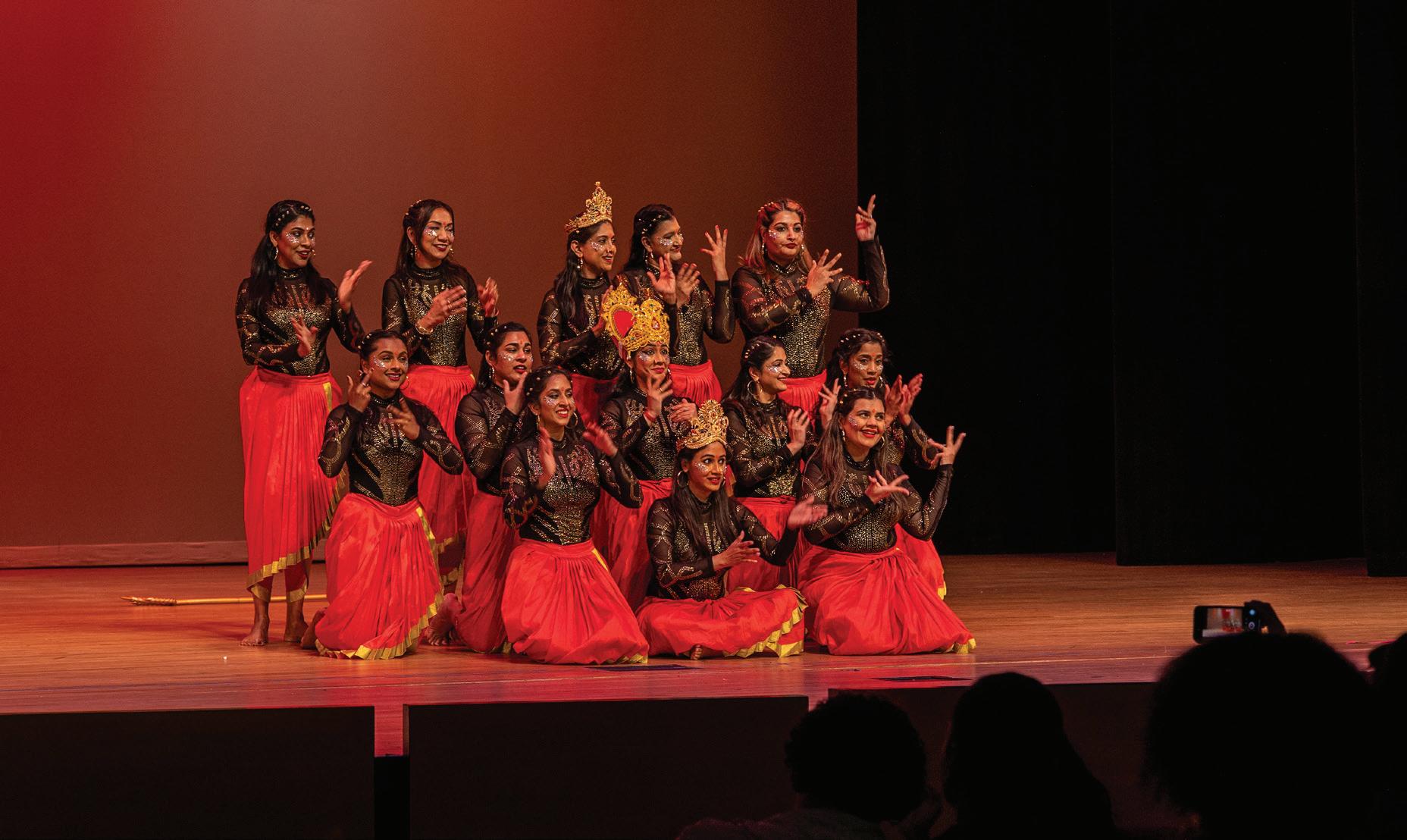
ship looks,” Freeman said.
Legislators promised that the $7-million increase for domes tic violence shelters would be provided annually. Despite his call in the legislative special ses sion on crime to uplift survivors, Gov. Jeff Landry has removed the funding for the shelters from the state budget.
Louisiana has one of the high est rates of domestic violence in the country. In 2021, Louisiana ranked fifth in the nation in ho micide rates where women are killed by men, and 81% of these in-state homicides were commit ted by a partner or ex-partner, SAFE Louisiana reported.

Freeman said her first memory is her mother protecting her and her sister from their abusive father. She said she did not join law enforcement because of her personal experience, but her experience has helped her support the survivors who she has encountered during her time with the police and at Iris.
In 2014, Louisiana resident Gwen Salley was kidnapped, shot and killed by her husband who was released from jail on bond after Salley had filed for divorce and a protective order. Gwen’s Law passed in the state in 2017, limiting bail eligibility for domestic violence offenders. At the sheriff’s department, Freeman saw the impacts of the law.
“I really saw the effects and
HEALTH, from page 3 students are unsure about their health insurance, there is a case manager at the health center who can help. The rest of the services the health center offers are included in students’ tuition.
“There’s no out-of-pocket cost for students to come see a therapist or a wellness coach or a dietician,” Eberhard said.
On Tower Drive March 20, the health center hosted “Kneaux Your Status,” an event with free HIV and STI testing. Students can come to the health center for free HIV tests at any point. The health center also hosted Connection Stations on Wednesday to engage with students. Partnering with Campus Life, Eberhard hopes to combat loneliness on campus, an issue he said is prevalent.
“They’re really just trying to create opportunities to connect students socially, and create a sense of belonging,” Eberhard said. “. . .[Loneliness] is a big focus in general. It can lead to students feeling disengaged when they don’t have a social circle, or they don’t have a sense of belonging on campus. It’s a big risk to their academic success.”
On March 20, students could receive an “emotional support plant” in the quad from 11 a.m. – 2 p.m. at “Planting Positivity.” This event centers on positive psychology and self-care, paralleling students’ needs with that of their plant.
On March 22 from 10 a.m.
what an impact that law can make, especially on a law enforcement level,” Freeman said. “We can provide statements, photographs, video, everything and anything because the judge needs to make an educated assessment of violence or danger and risk against that offender before setting bond.”
Freeman worked closely with survivors of domestic violence during her time in the police force. She said this experience has impacted the support she is able to provide survivors at Iris.
“It made me understand clearly that the services of Iris are absolutely a need in this community – or in any community really,” Freeman said. “That the outreach and education, along with the services and resources that are provided by organizations such as ours, are a necessity.”
to noon students could pick up a free donut at “Dieticians Eat Donuts” at Free Speech Alley. This event promoted healthy relationships with food.
“The message of that event is: ‘all foods can fit,’” Eberhard said. “That’s really one of the key messages that our dietitian practices. Not labeling foods as good or bad, just talking through good nutritional education. We tend to demonize certain foods, and so it’s kind of a play on that. Even someone who is really highly trained in nutrition eats donuts.”
Eberhard hoped Tiger Wellness Week would share with students a glimpse of what services the center provides.
“My goal and my vision is to create an entry point for a conversation for students to develop self-awareness, to develop awareness about some of these concepts we are trying to educate about,” Eberhard said. “And then, for students that feel like they can take that concept themselves, that’s amazing.”
And for students who need help with these needs, Eberhard said the health center and the LSU community are here to support them.
“From that perspective, helping students connect the dots about how intersectional wellness is,” Eberhard said. “It’s not just about coming to see a therapist to improve your mental health ... A lot of different campus services can help meet that need that a student is finding that they are struggling with.”
Mike Weary, 36, works in a dimly lit studio. It’s quiet, but there are whispers all around. Different sized canvases are stationed in different areas. Each one is a beautiful painting pouring out with storytelling.
Since 2021, Weary has been an artist-in-residence at the Arts Council of Greater Baton Rouge, or what he refers to as home.
He first discovered his love for art at 6 years old, and has been self-taught ever since.
“I’ve taken classes throughout, but I never intentionally went to school to be a painter,” Weary said.
Weary said he used to draw in the breakroom of his mother’s job at Home Depot. She would sometimes work shifts and there would be no one to watch him, Weary said. He filled up the time by drawing.
Around this time, he started to notice a skill he had for capturing people’s likenesses. He grew up in New Orleans and attended Brother Martin High School. Weary said that while living in the Gentilly area he felt the buzz of artistic energy from his community.
“I was really in my own little ecosystem,” Weary said. “I realized everyone around here knows how to do something. Either you did music or dance and even sports have a sort of artistic quality to it.”
Weary said he’s coined his style of work as Dorian Gothic, inspired by Oscar Wilde’s “The Picture of Dorian Gray.”
Many of his paintings feature real people, but through a distorted lens. In the corner of his studio, there is a large painting resting next to a bright lamp. It’s an image of an older Black man with bluish skin. He has a June Bug sitting right above his upper lip.
“When people see it, sometimes they see the bug itself, which is a June Bug,” Weary said. “But a lot of Black people have someone named June Bug in their family.”
The painting is titled “I Found June Bug Dangling in an Oak.” The painting is meant to reference anti-lynching. He said the ambiguity of the painting allows for members of the community to connect in specific ways.
Weary said he enjoys using his art in ways that benefit and strengthen the community.
He is leading an arts initiative called “Arts for Everybody,” which will take place July 27. This is a country-wide event involving 19 different cities. There will be different art shows and activities throughout the day, all themed under the prompt: There’s No Place Like Home.
Weary said this is in conjunction with the office of the MayorPresident, Baton Rouge Advancement for Health Literacy and One Nation One Project. He said the
arts council will try to do as many installments throughout the city as possible.
“Literally everybody in Baton Rouge is being asked to participate with their art. No matter what that art is, come be a part of it,” Weary said.
The whole point is to prove that the arts can lead to healthier people and healthier communities, Weary said. Therefore, the arts council will be partnering with different healthcare providers.
Renee Chatelain, former chief executive officer of the arts council, said Weary’s work caught her attention one day at an urban arts festival in 2021. She said their exchange that afternoon led to him becoming the first resident artist at the Cary Saurage Community Arts Center.
Chatelain also serves on the advisory board of the “Arts for Everybody” project. She said she approached Weary about being the project director and he agreed. Chatelain described Weary as a thoughtful community leader and advocate.
“It’s already what he does so naturally and so well,” she said. “He said he wanted to do the project, and from there, he’s just been magical.”
Weary said because he is selftaught, he can work from places that feel more organic and less formulaic.
“If I didn’t have any interest in art at all, then I decided to go to school for it,” Weary said, “I think I would’ve had more barriers on mentally on how to approach it.”
Weary never knows when inspiration will strike. Oftentimes, concepts pop into his head and then he translates them through his own view, he said.
Through videos on social media and live paintings, many people have noticed something intriguing about his methods. Weary often paints with the canvas upside down. Why?
“I never knew why,” he said, “I’ve been painting faces for like 30 years, so I know proportionally where everything should be. It just feels right.”
It may seem like a way to flex his artistic abilities, he said, but
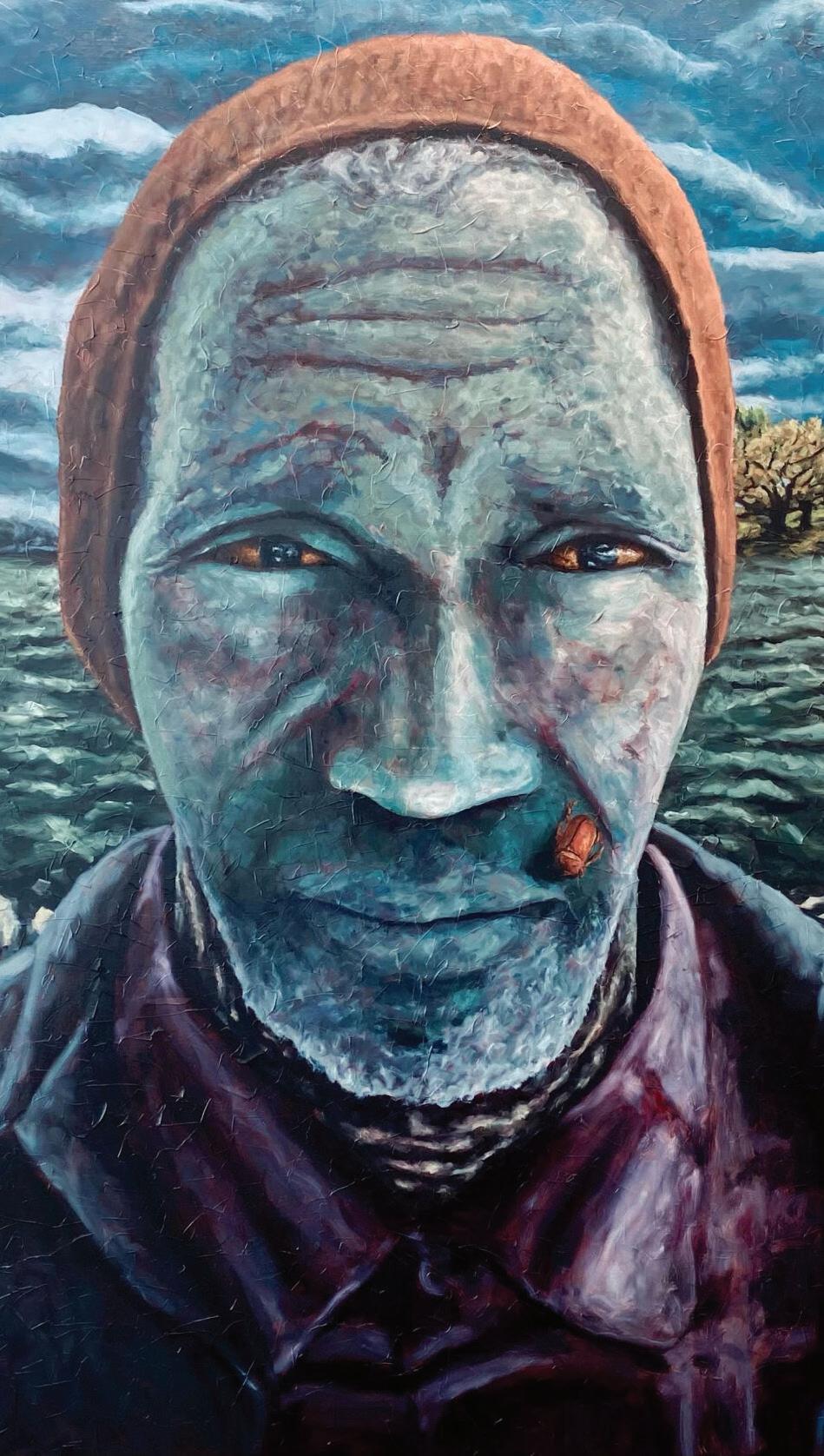
he used to be self-conscious about painting upside down. He said he forced himself to paint rightside up whenever people were watching.
Maia Weary, Weary’s wife, is also his manager. He said that for years, she tried to convince him to do live paintings for weddings, especially when she saw a demand. After hesitations in the beginning, Weary eventually gave in and he said it helped him sharpen his skills.
Maia Weary said the two met as freshmen when they both attended the University of Louisiana at Lafayette. Mike Weary said he didn’t complete the program; however this allowed him to devote more time to his passion.
“I just felt like he always had a story behind everything,” Maia Weary said. “It may look like
something random to the average person, but there’s always something behind it.”
Maia Weary said Mike Weary’s creativity is already rubbing off on their children. She said her son, who’s 4 years old, often enjoys painting and working on projects with Mike Weary.
Mike Weary said every artist is self-taught in their own way. It’s about what information and craft elements you choose to express, he said.
One piece of advice that Mike Weary had for younger artists was to use their creativity to find a way to pay for their art materials.
“Once you have ways to pay for your art materials, put that art out. Show as many people as possible,” he said. “All you have to do is be yourself. Know thy self and be thy self.”
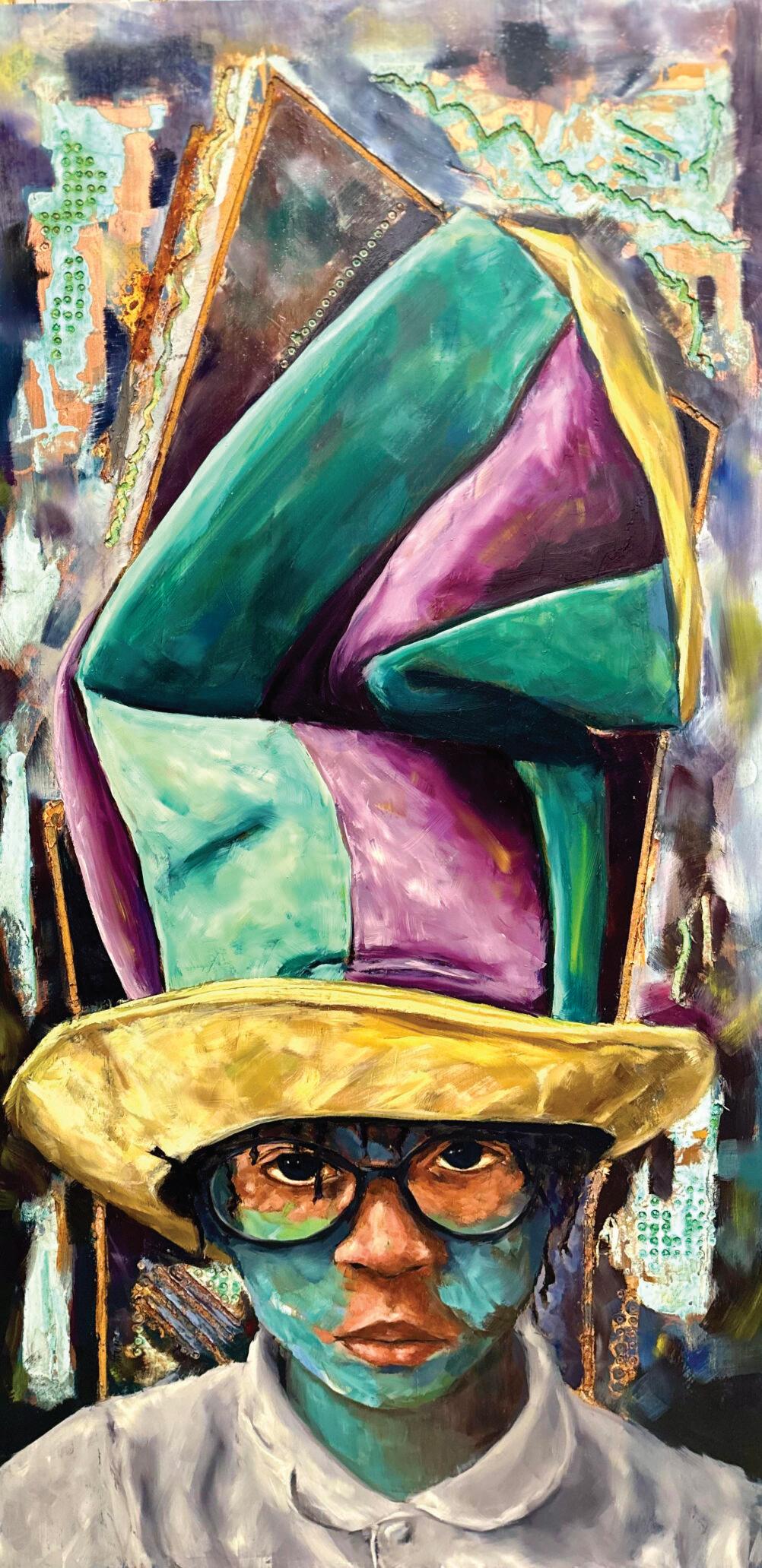
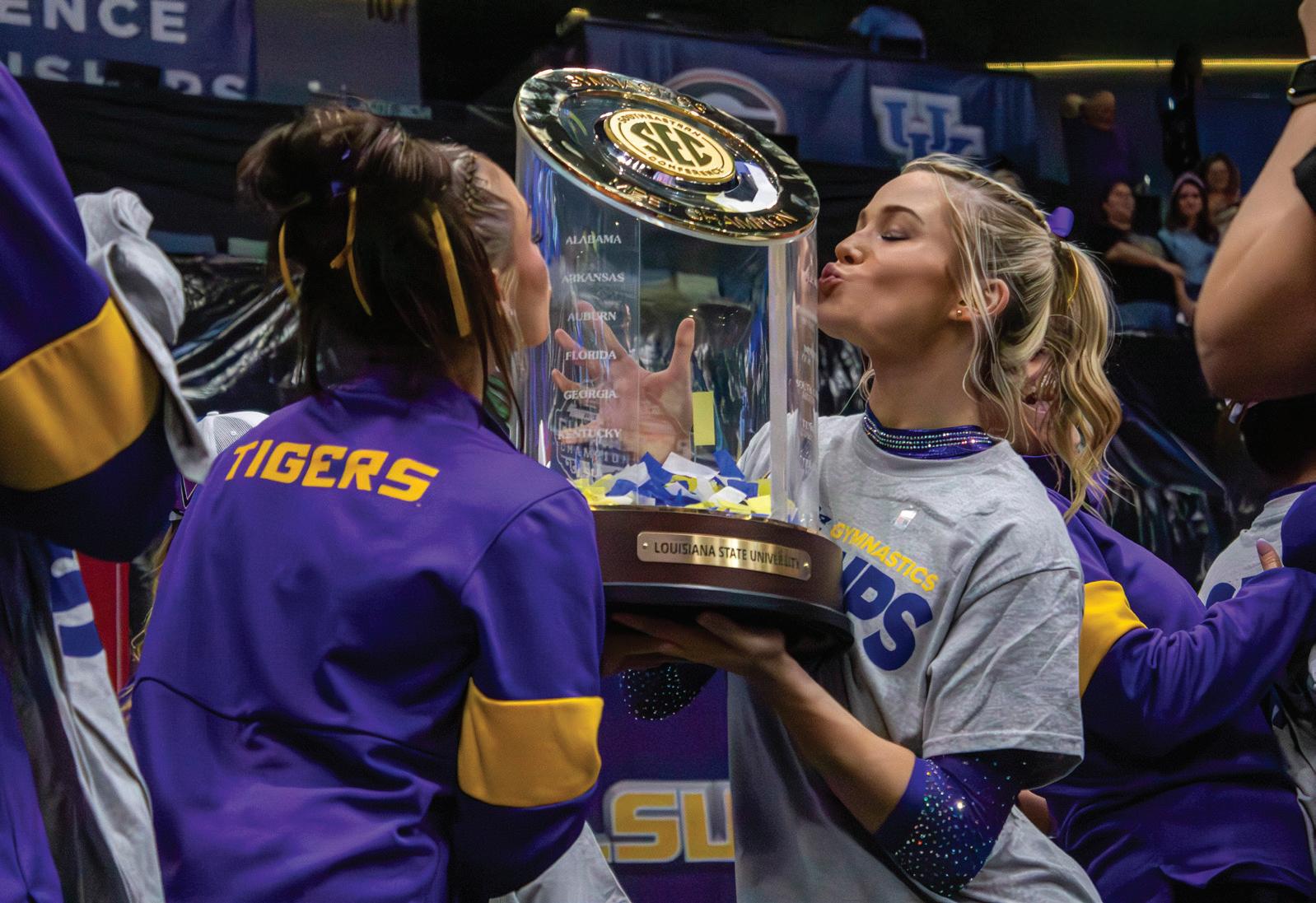
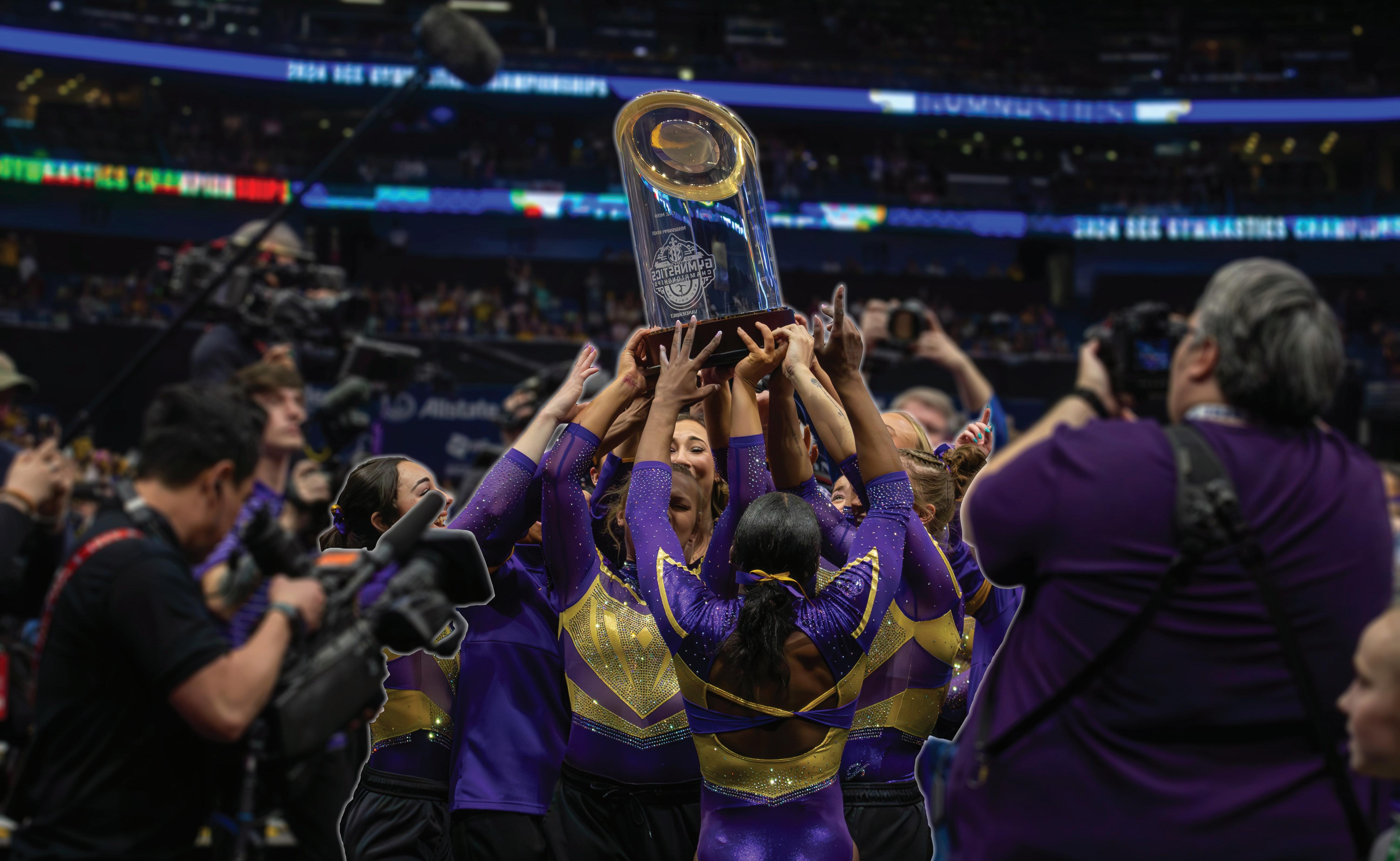


LSU Gymnastics wins SEC Championship with a 198.075 at the Smoothie King Center in New Orleans March 23rd
 Photos by Francis Dinh
Photos by Francis Dinh




LSU won its fifth Southeastern Conference Gymnastics Championship with a score of 198.075, including two perfect 10s.
The Tigers were the only team to break 198. Alabama came in second with 197.750; Kentucky followed with 197.60; and Florida finished fourth with 197.30.
“This is a great group, and I’m very proud of how they’ve gone about their business all year long,” head coach Jay Clark said. “Any four of these teams could’ve won this thing.”
Although the Tigers finished the first half of the rotation tied for first, they shined the most in the second half of the meet.
Once again, the Tigers’ floor routine proved to be the best in the country, as LSU posted only one sub-9.90 score out of its top five, including a perfect 10 by Kiya Johnson.
“We’re very, very confident on the floor,” Haleigh Bryant said. “We just wanted to be normal— nothing more, nothing less.”
Freshmen Konnor McClain

and Amari Drayton got things started for the Tigers on the floor. McClain followed her perfect score on beam with a 9.925, and Drayton scored a 9.850. KJ
Johnson tied her career-high floor score with a 9.975, then Bryant followed with a 9.950, setting up Kiya Johnson for her ninth career 10.
The Tigers started the second half of the meet on balance beam, where McClain scored
If there is a will, there is a way.
That was the case for LSU women’s basketball. The Tigers battled back in the second half to secure an 83-56 win over Middle Tennessee State in the Round of 32 of the NCAA Tournament.
Middle Tennessee tested the Tigers in the second quarter, as the Blue Raiders went into halftime with a 36-32 lead. A 21-point second quarter from the Blue Raiders shifted the intensity in their direction.
But the Tigers did enough during the first half to get the Blue Raiders into foul trouble and carried that into the second half. It all started with the Tigers’ defense.
With Middle Tennessee having to make adjustments due to its foul trouble, LSU rediscovered its rhythm in the third quarter. After regaining the lead with separation toward the end of the third quarter, the Tigers found them -
see SURGE, page 4
LSU women’s basketball head coach Kim Mulkey gave a fiery opening statement to her Saturday press conference in which she threatened to sue the Washington Post if it publishes a “false story” about her.
The rumor of a potential story about Mulkey started when Pat Forde of Sports Illustrated made a post on X (formerly Twitter) stating that a story could be in the in the works.
“Hearing some buzz about a big Washington Post story in the works on LSU women’s hoops coach Kim Mulkey, potentially next week. Wagons being circled, etc,” Forde said.
Less than 24 hours later, Mulkey gave a prepared statement to begin her already scheduled Saturday press conference. The statement was over three minutes long and threatened legal action if the Washington Post published a “false story.”
“I’ve hired the best defamation law firm in the country and I will sue the Washington Post if they publish a false story about me,” Mulkey said.
She also claimed that the re -
porter has been working on the story for two years and contacted LSU on Tuesday with “more than a dozen questions” with a deadline on Thursday to answer those questions.
Mulkey called the deadline “ridiculous” and “an attempt to prevent me from commenting and an attempt to distract us from this tournament.”
However, Mulkey also stated that the reporter has been trying to set up an interview with her for two years.
She said that she declined to speak with the reporter two years ago because of what she called a “hit job” that he wrote about LSU football head coach Brian Kelly.
The story Mulkey labeled a “hit job” was titled “In Baton Rouge, there’s a $100 million football coach and everyone else,” and was more about Louisiana’s economics and Kelly’s pay than Kelly himself.
Mulkey claims that the Washington Post has reached out to former players, offering them anonymity if they “say negative things” about her.
“Reporters who give a megaphone to a one-sided, embellished version of things aren’t
trying to tell the truth, they’re trying to sell newspapers and read the click machine,” Mulkey said. “This is exactly why peo -
ple don’t trust journalists and the media anymore.
“I’m fed up, and I’m not gonna let The Washington Post
attack this university, this awesome team of young women I have or me without a fight,” she said.

CHAMPIONS, from page 9
the first perfect 10 of the night.
“I’m just proud of Konnor,” Clark said. “It was a total group effort, and it came from different places.”
Her routine was preceded by Sierra Ballard’s powerful leadoff performance. Ballard scored a 9.80, and Savannah Schoenherr followed with a solid 9.850. After McClain’s 10, Bryant scored a 9.950, setting up Aleah Finnegan to anchor with a 9.875.
LSU went into its final event in second place. Kentucky led with 148.425, followed by LSU at 148.40. Alabama was in third with 148.20, and Florida trailed with 147.850.
With the Tigers as the top seed, they started the night on vault. KJ Johnson stuck the first landing of the night, scoring a
9.875. Finnegan and Schoenherr followed with 9.850s, then Kiya Johnson scored the first 9.90+ score of the night (9.925). Bryant anchored with a 9.975.
LSU and Alabama ended the first rotation at the top with a score of 49.475. Kentucky followed with 49.425 and Florida trailed with 49.400.
Alabama took LSU’s spot on vault while the Tigers moved to uneven bars.
Kiya Johnson led with a 9.825, and Ashley Cowan followed with a 9.950. McClain scored a 9.90, Schoenherr followed with a 9.850 and Bryant anchored with a 9.90.
LSU and Kentucky’s total score increased to 98.925, followed by Alabama at 98.775 then Florida at 98.575.
LSU entered the meet ranked No. 1 for the first time since
2019. It was followed by Florida at No. 2, Kentucky at No. 3 and Alabama as the No. 4 seed.
“We’ve done the work all year and now it’s just about being confident and doing our normal,” Clark said earlier in the week. “If we do that, then we’ll see how the chips fall.”
The chips fell in LSU’s favor.
With the exception of a select few out-of-state fans, the Smoothie King Center was packed with purple and gold, emitting the feeling of a home meet for LSU. The Tigers delivered for their fans.
“We certainly want success at this meet, but this isn’t our final destination,” Clark said earlier in the week.
The Tigers’ next challenge lies at the NCAA Regionals.
“We’re not done yet,” Bryant said. “The sky’s the limit.”
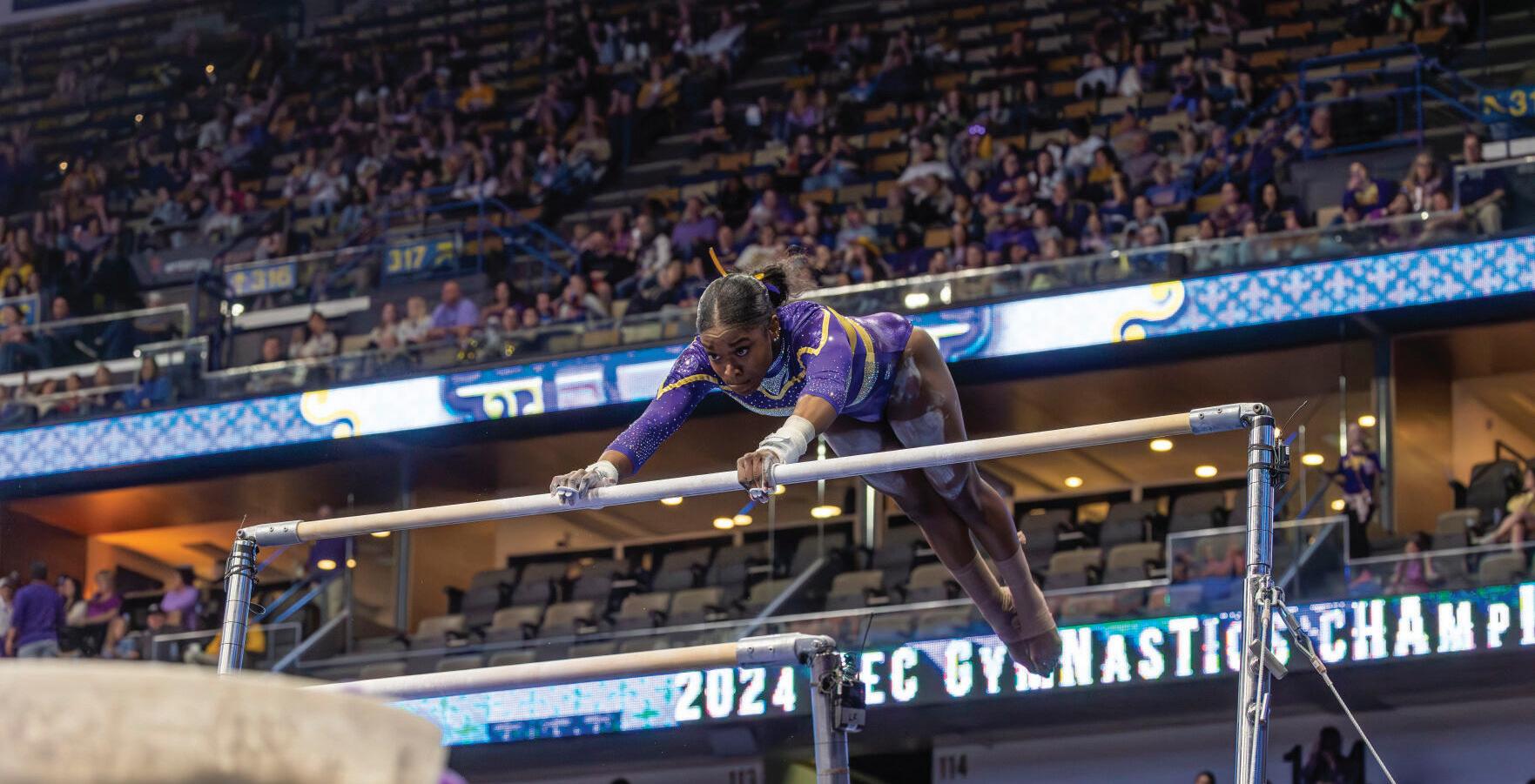
selves in the driver’s seat once again.
Flau’jae Johnson led the Tigers with 21 points, shooting 6-for-10 from the field and 1-for-2 from three. She added four rebounds and two assists.
Mikaylah Williams was a threat on the perimeter, finishing with 16 points, shooting 6-for-11 from the field and 2-for-5 from three. She added six rebounds, too.
But along with the scoring efforts of Johnson and Williams, the defensive efforts in the paint from Aneesah Morrow and Angel Reese were imperative for LSU.
With under a minute left in the third quarter, Middle Tennessee’s 6-foot-6-inch center, Anastasiia Boldyreva, fouled out of the game, eliminating the Blue Raiders’ primary source of paint production. Boldyreva finished the game with nine points and two rebounds. Reese finished with a doubledouble of 20 points and 11 rebounds. She shot 6-for-17 from the field. Morrow was right behind with a double-double of 19 points and 13 rebounds, shooting 6-for-14 from the field and 1-for-3 from three.
The Blue Raiders worked to slow the game down in the second quarter, but LSU threw Middle Tennessee off-balance once the Blue Raiders had to be even more careful.
When LSU couldn’t score, it worked to lessen Middle Tennessee long-term.
All of Middle Tennessee’s starters finished the game with more than three fouls. Ta’Mia Scott fouled out of the game mid-way
through the fourth quarter for Middle Tennessee. She finished with 15 points and five rebounds, and shot 3-for-7 from three.
In addition, Blue Raiders’ 6-foot-5-inch center, Iullia Grabovskaia, played with four fouls, making her play more careful in the paint.
This was essential for LSU being that Middle Tennessee runs a six or seven-player rotation. Once their options were depleted, the Blue Raiders had to improvise to the point where they didn’t have the options to keep up with LSU’s pace.
Savannah Wheeler led Middle Tennessee with 21 points and seven rebounds. She shot 8-for-24 from the field, and 4-for-4 at the free throw line. Her seven turnovers also allowed LSU to play at the fast pace it wanted.
Wheeler finished the game with three fouls, and starting guard Jalynn Gregory finished with four. She scored six points, shooting 2-for-10 from three.
In the Sweet 16 and potentially beyond, the Tigers may not be able to play at the fast pace it desires. But Sunday afternoon showed that LSU is capable of beating a team with its defense.
Along with its solid defense, LSU kept its turnovers to a minimum, as it ended with just seven as a team. Against Rice, the Tigers allowed 24 turnovers.
LSU will now advance onto the Sweet 16 at the MVP Arena in Albany, New York, and will play the winner of No. 2 seed UCLA and No. 7 Creighton. The Bruins and the Blue Jays tip-off on Monday at 7:30 p.m. C.T. on ESPN2.
LSU will tip-off in the Sweet 16 on March 30 at a time to be determined.
Garrett Nussmeier spent the last three spring practice cycles either as the understudy or in fierce competition for the starting job. Now, he enters his senior year as the new face of the offense that is coming off one of its best seasons ever.
Expectations are high for any new quarterback, but there’s hardly any bigger pressure than replacing a Heisman Trophy-winning quarterback who led the best offense in college football.
That’s what Nussmeier is tasked with in 2024, but despite the pressure coming with his new role, his mindset hasn’t changed.
“I’ve just tried to do my job and do what I feel like I’ve always been taught to do as far as leadership goes,” Nussmeier said.
Despite only having one start in his college career, Nussmeier returns to the offense in 2024 as one of the group’s most experienced players. He’s one of a handful of players who have been with Brian Kelly since he arrived at LSU, allowing him to understand the expectations within the program.

Nussmeier told reporters that 10 wins wasn’t the team’s goal anymore, but made it clear that the goal isn’t strictly tied to results.
“I’m not sitting here saying we have to win a national championship or we bust. What I’m saying is that we have to start building a championship culture and the thought of 10 wins is not enough in our minds, and it starts with the little things that we’re doing now,” Nussmeier said.
One of Nussmeier’s traits the Kelly complimented was his ability to hold teammates accountable. An illustration of that is his role as one of LSU’s SWAT team leaders.
Nussmeier’s leadership.
Not only are the Tigers replacing probably their second-best quarterback of all time, but leadership at the top is changing too. Broyles Award finalist offensive coordinator Mike Denbrock left LSU for Notre Dame, making way for a new play caller.
Joe Sloan and Cortez Hankton were promoted to co-offensive coordinators, two coaches that Nussmeier has already worked with for two years.
LSU also lost its two most productive receivers who will likely both be first-round draft picks. Malik Nabers and Brian Thomas Jr. accounted for over half of LSU’s total completions last season.
“He has the ears of everybody on the offense,” Kelly said. “He backs up what he does by deed. If he says he’s going to do something, he does it and he holds others accountable.”
Nussmeier is one of the examples of how LSU is becoming what Kelly describes as a “player-led” team. That starts with putting an emphasis on the smaller details
Kelly calls him a “natural leader,” and someone players listened to even before he became a starter.
that Kelly has preached since arriving at LSU.
Whether it’s organizing throwing sessions with the receivers or watching film together, Nussmeier said he’s using his experience as a starting quarterback during his career before college to understand how he needs to play the role of the starting quarterback.
Another facet of his leadership is setting the expectation within the locker room.
SWAT teams, which stands for spring/summer workout accountability teams, are groups led by a captain to encourage habits that build accountability and discipline. Each team can earn points by doing little things such as being on time or completing daily tasks.
Kelly shared that Nussmeier’s team is often one of the most productive SWAT teams in terms of scoring points.
“He’s a guy that backs up what he does and guys follow guys that mean what they say and do it,” Kelly said.
On the field, LSU will need
LSU brought in transfers Zavion Thomas and CJ Daniels to fill those holes on the depth chart, but asking them to give the same production is a tall order.
Despite the changes in coaching and personnel, Nussmeier says the offense remains largely the same.
“There is a lot of new things and a lot of different aspects into our offense… But who we are as an offense and who we are as a team I don’t think necessarily will change that much,” Nussmeier said.
If you’ve ever been to LSU’s Main Library, then you’ve probably noticed the elaborate graffiti drawn on the desks. It tends to range from funny messages to political statements to bizarre and sometimes disturbing graphics. I figured it would be interesting to rank the top 10 works of art created by the great students of LSU.
Due to the constraints of a physical newspaper, here are the top five. For the rest, check out the article at the Reveille’s website.
All photos by Amyri Jones.
1 2 3 4 5
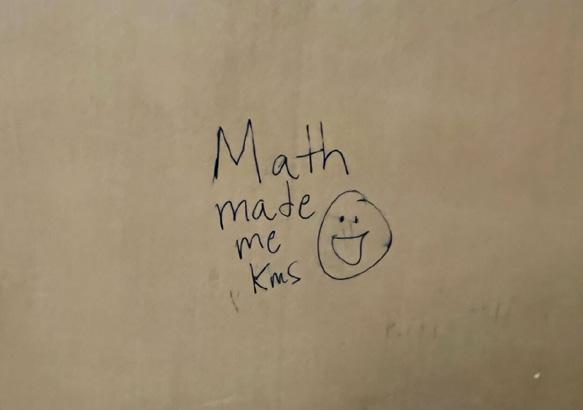
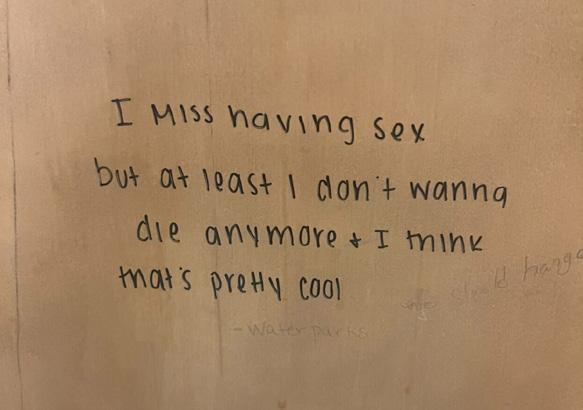
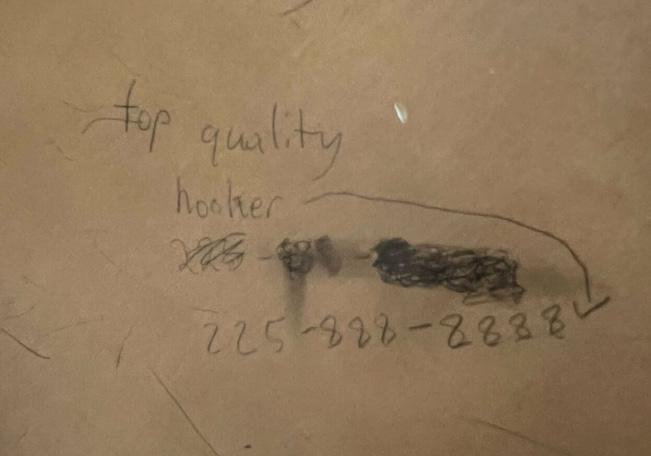
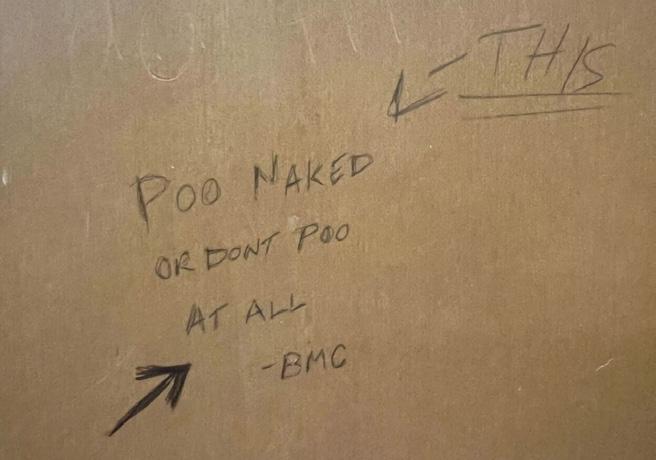

I definitely relate to spot five, I’ve always had a hate-hate relationship with math, and it was nice seeing that I wasn’t the only one questioning life after not being able to solve a math problem. The smiley face also sells the pure feeling of apathy that consumes one’s soul after a three-hour session of math homework.
Whoever wrote the quote for spot four, felt the need to share their feelings. I give an E for effort. Being alive is fun even despite involuntary or voluntary celibacy. Witnessing this unknown library-goer’s therapeutic breakthrough was beautiful. I’m glad that campus has such an open and honest student body.
For spot three, the number for a “top-quality hooker” was provided. If you dial this number, I won’t judge you… Actually, yes, I will. Anyone who dials the number with their hopes up is sure to be disappointed, though, as Baton Rouge area locals may recognize the phone number from the billboards of Gordon McKernan, a lawyer with a very bombastic approach to advertising. Maybe this is a new idea for an ad campaign!
Coming in at spot two, someone left a recommendation for the LSU student body. I understand this point to be honest, but did I need to read that while studying for my exam? No. What pushes this over the edge though is that someone else emphasized the message. I like to think that the person was skeptical at first, but upon taking the advice, they had to help spread the gospel.
For spot one, we have what starts off as a sweet message, but ends sour. “Change is inevitable, growth is optional… Ligma balls.” Wow, who knew that motivation and harassment could be carried out in one sentence. Everybody’s so creative. The flowers used as ornamentation for this philosophical message really emphasize the beauty of it. It’s Yin and Yang. It’s light and dark. It’s beautiful flowers, and it’s ligma balls. A cold and a broken Hallelujah.
library and check out all the graffiti that’s located on almost all the study desks. You’ll be either amused, inspired or feel as though you’re not alone.
Amyri Jones is a 22-year-old digital advertising and religious studies senior from Baton Rouge.

Any woman knows that your period is the biggest bitch in your life, and perhaps the worst part is the lack of accommodations that schools and businesses offer women while they’re on their periods.
For example, LSU only has 13 specific locations on campus that offer free supplies, one of which is the Women’s Center.
Though the Women’s Center has made some strives through its Period Project, every bathroom on campus should have pads and tampons. It shouldn’t only be the Women’s Center devoted to helping women in their times of need.
Accidents happen. Sometimes, periods appear out of the blue, and someone may not have any supplies in their backpack.
So having these supplies in the bathroom would be a perfect resource. However, you’ll be out of luck most of the time because products are only offered in 13 locations on over 1,000 acres of land, which is utterly ridiculous.
No matter your socioeconomic status, everyone deserves access to feminine hygiene products, including college students.
Perhaps the saddest part of this whole issue is that I’ve seen more on-campus organizations handing out contraceptives than period products. Though contraceptives are incredibly impor-

tant, so are period supplies.
Why can’t more student organizations or LSU work to get the funds for these and offer them to students? Or put them in all of the bathrooms across campus? Yes, period products are expensive, but that’s another reason why having a university spend some money in that department helps everyone.
Not only is the lack of feminine products an issue on campus, but so are the uncomfortable plastic chairs that women are forced to sit in throughout
class.
For any guys out there, just imagine getting a vasectomy and having to cross your legs while sitting in a plastic chair. That’s pretty much the same feeling as sitting in a plastic chair while on your period.
I mean, come on, LSU. It’s 2024. I feel like we can upgrade the chairs a little bit. I’m not saying that we need to have gaming-quality chairs, but maybe something with more cushion (especially in Lockett Hall).
Unfortunately, not only are
college students facing issues when it comes to their periods, but so are female employees.
Though I’m not currently working at any sort of company, I can only imagine how it feels to have to put a smile on your face and go into the office as in excruciating pain.
What kind of world do we live in that women feel the need to do that just to get some work done?
I realize that having a job and paying the bills is vital to survival, but hello, there’s a popular video conference program called
Zoom. That was the best thing that came out of COVID-19: realizing that people can work from home.
So, why can’t women work from the comfort of their homes while on their periods? Periods typically only last for about two to seven days, so it’s not like women would be working from home for too many days out of the month.
Spain has been the best at dealing with this issue.
According to the Washington Post, women in Spain can take three to five days off for monthly menstrual leave. Yes, you read that right, every month. And they even get paid during that time frame, so it’s pretty much paid maternity leave without the birth.
Yet here in the United States, we don’t have anything related to menstrual leave or even the notion that women could work in the comfort of their homes while on their periods.
Is it because some men would get their little feelings hurt if women took a few days off every month for their periods? Or is it because U.S. companies are lazy and don’t want to help women?
Either way, we must do better to provide supplies and accommodations for women while they endure a significant amount of pain. And the fact that we don’t simply demonstrates how little we as a society give a damn about women’s needs.
Taylor Hamilton is a 19-year-old mass communication sophomore from Tallahassee, Florida.

@9are_bear
The university had 2,052 international students attending in the fall of 2021, according to a report published by LSU International Services. These students come from all over the world, obviously, and while they do have access to the International Services office, it’s not enough.
If they crave the foods and flavors of their non-American homes, they have to rely on either the transportation required to get there or to a store or restaurant that offers those culinary options. But I’d argue there’s something LSU can do for our international peers and, by association, the student body at large.
I propose that LSU gets an on-campus international/foreign market for the people, open to both students and the public.
This space for international culture exchange wouldn’t have to be large, but it’d be nice if it was.
At the bare minimum, it could be a cookie-cutter foreign

market, with shelves of cultural foods, supplies and the like. But if given the chance, it could be so much more. The store could have a mini-cafe, which would serve as a place for students to sit down and hang out, to just exist outside of the hustle and bustle of the rest of campus, someplace not built on education but rather on human
connection.
The store could also have a sort of “student submission” bar, a place for students to make international dishes or products for money, kind of like a farmers market stall inside the store. This would be a place for students to share their culture and for others to try to learn from and appreciate it.
GRAPHIC BY JACOB CHASTANTI’m sure that there are those reading this and saying, “This is unnecessary. This is a luxury and naive and stupid.”
They’re correct, sort of. This is a luxury, and it’s not a necessary facet of LSU. But we’re in an era of immense divide. Look around you; look inside you. There’s a separation between people that must be mended.
This store could help facilitate that on campus.
There are several other reasons a foreign market would be a lovely addition to LSU.
First, LSU doesn’t have one. It’d be rad if we did. A true boon. If we had a foreign market, it’d give us another thing to brag about to all the other Southeastern Conference schools.
Second, jobs will be created. Especially for international students who may not have an easy time adjusting to the American workflow.
It’d also allow those who are more shy to meet up and be forced to interact with more people in a way that doesn’t make them feel embarrassed or like they’re forcing themselves onto others in the name of friendship.
Though this proposition for a foreign market may be viewed as silly, it’s my belief that it’d do nothing but enrich LSU’s student body for years to come. It’d produce a communal space that would allow for a stronger bond between students of various backgrounds.
Garrett McEntee is an 18-yearold English freshman from Benton.